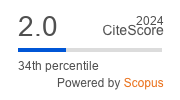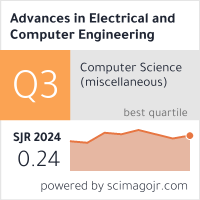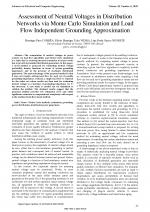| 4/2020 - 6 |
Assessment of Neutral Voltages in Distribution Networks via Monte Carlo Simulation and Load Flow Independent Grounding ApproximationCORREA, H. P. |
| Extra paper information in |
| Click to see author's profile in |
| Download PDF |
Author keywords
Monte Carlo methods, estimation, grounding, power distribution, distributed power generation
References keywords
power(31), systems(17), distribution(9), phase(7), flow(7), electric(7), tpwrs(5), research(5), quality(5), jepsr(5)
Blue keywords are present in both the references section and the paper title.
About this article
Date of Publication: 2020-11-30
Volume 20, Issue 4, Year 2020, On page(s): 45 - 52
ISSN: 1582-7445, e-ISSN: 1844-7600
Digital Object Identifier: 10.4316/AECE.2020.04006
Web of Science Accession Number: 000594393400006
SCOPUS ID: 85098212215
Abstract
The computation of neutral voltages in power systems via load flow algorithms and Monte Carlo simulation is a topic that is receiving increased attention in recent works due to growth in installed distributed generation. In this paper, a novel method is proposed for estimating neutral voltage probability density functions in terms of system grounding impedances and in the presence of stochastic distributed generation. The main advantage of the proposed method is that it does not require solving load flow for each set of possible grounding impedances. Instead, a single load flow is required for the entire set, whose results are then used for estimating neutral voltage as a function of grounding impedance via Y-bus inversion. A case study is carried out via simulation to validate the method. The obtained results suggest that the proposed method provides low estimation error and yields significant reduction in computational complexity with respect to the standard load flow-based method. |
| References | | | Cited By «-- Click to see who has cited this paper |
| [1] D. Graovac, V. Katic and A. Rufer, "Power quality compensation using universal power quality conditioning system," IEEE Power Engineering Review, 2000, 20, (12), pp. 58-60. [CrossRef] [SCOPUS Times Cited 82] [2] W. E. Kazibwe, R. J. Ringlee, G. W. Woodzell and H. M. Sendaula, "Power quality: A review," IEEE Computer Applications in Power, 1990, 3, (1), pp. 39-42. [CrossRef] [SCOPUS Times Cited 25] [3] H. M. S. C Herath, V. J. Gosbell, and S. Perera, "Power quality (PQ) survey reporting: Discrete disturbance limits," IEEE Transactions on Power Delivery, 2005, 20, (2), pp. 851-858. [CrossRef] [SCOPUS Times Cited 43] [4] F. Nejabatkhah, Y.W. Li and H. Tian, "Power quality control of smart hybrid AC/DC microgrids: An overview," IEEE Access, 2019, 7, pp. 52295-52318. [CrossRef] [SCOPUS Times Cited 237] [5] K. Bhatia, P.B. Darji and H.R. Jariwala, "Safety analysis of TN-S and TN-C-S earthing system," 2018 IEEE International Conference on Environment and Electrical Engineering and 2018 IEEE Industrial and Commercial Power Systems Europe (EEEIC/I CPS Europe), 2018, pp. 1-6. [CrossRef] [SCOPUS Times Cited 5] [6] R. B. Standler, "Protection of electronic circuits from overvoltages,", Electrical Engineering Series. Dover Publications, 2002. [7] T. H. Chen and W. C. Yang, "Analysis of multi-grounded four-wire distribution systems considering the neutral grounding," IEEE Transactions on Power Delivery, 2001, 16, (4), pp. 710-717. [CrossRef] [SCOPUS Times Cited 89] [8] T. Chen, M. Chen, T. Inoue, P. Kotas, and E.A. Chebli, "Three-phase cogenerator and transformer models for distribution system analysis," IEEE Transactions on Power Delivery, 1991, 6, (4), pp. 1671-1681. [CrossRef] [SCOPUS Times Cited 273] [9] D. R. R. Penido, L. R. de Araujo, S. Carneiro, J. L. R. Pereira and P. A. N. Garcia, "Three-phase power flow based on four-conductor current injection method for unbalanced distribution networks," IEEE Transactions on Power Systems, 2008, 23, (2), pp. 494-503. [CrossRef] [SCOPUS Times Cited 123] [10] V. M. da Costa, M.L. de Oliveira and M.R. Guedes, "Developments in the analysis of unbalanced three-phase power flow solutions," International Journal of Electrical Power & Energy Systems, 2007, 29, (2), pp. 175 - 182. [CrossRef] [SCOPUS Times Cited 35] [11] R. M. Ciric, L.F. Ochoa and A. Padilha, "Power flow in distribution networks with earth return," International Journal of Electrical Power & Energy Systems, 2004, 26, (5), pp. 373 - 380. [CrossRef] [SCOPUS Times Cited 25] [12] R. M. Ciric, A.P. Feltrin and L.F. Ochoa, "Power flow in four-wire distribution networks - General approach," IEEE Transactions on Power Systems, 2003, 18, (4), pp. 1283-1290. [CrossRef] [SCOPUS Times Cited 223] [13] H. P. Correa and F.H.T. Vieira, "Load flow independent method for estimating neutral voltage in three-phase power systems," Energies, 2019, 12, (17). [CrossRef] [SCOPUS Times Cited 4] [14] D. Poli, P. Pelacchi, G. Lutzemberger, T.B. Scirocco, F. Bassi and G. Bruno, "The possible impact of weather uncertainty on the dynamic thermal rating of transmission power Llines: A Monte Carlo error-based approach," Electric Power Systems Research, 2019, 170, pp. 338 - 347. [CrossRef] [SCOPUS Times Cited 25] [15] C.T. Gaunt, E. Namanya and R. Herman, "Voltage modelling of LV feeders with dispersed generation: Limits of penetration of randomly connected photovoltaic generation," Electric Power Systems Research, 2017, 143, pp. 1 - 6. [CrossRef] [SCOPUS Times Cited 46] [16] M. K. Gray and W.G. Morsi, "Probabilistic quantification of voltage unbalance and neutral current in secondary distribution systems due to plug-in battery electric vehicles charging," Electric Power Systems Research, 2016, 133, pp. 249 - 256. [CrossRef] [SCOPUS Times Cited 18] [17] M. K. Gray and W.G. Morsi, "On the impact of single-phase plug-in electric vehicles charging and rooftop solar photovoltaic on distribution transformer aging," Electric Power Systems Research, 2017, 148, pp. 202 - 209. [CrossRef] [SCOPUS Times Cited 30] [18] M. Bazrafshan, and N. Gatsis, "Comprehensive modeling of three-phase distribution systems via the bus admittance matrix," IEEE Transactions on Power Systems, 2018, 33, (2), pp. 2015-2029. [CrossRef] [SCOPUS Times Cited 108] [19] M.J.E. Alam, K.M. Muttaqi and D. Sutanto, "A three-phase power flow approach for integrated 3-wire MV and 4-wire multigrounded LV networks with rooftop solar PV," IEEE Transactions on Power Systems, 2013, 28, (2), pp. 1728-1737. [CrossRef] [SCOPUS Times Cited 112] [20] S. Arora and B. Barak, "Computational complexity: A modern approach," Cambridge University Press, 2009. [21] C. Robert and G. Casella, "Introducing Monte Carlo methods with R," Use R., Springer, 2010. [22] M. Abdelaziz, "GPU-OpenCL accelerated probabilistic power flow analysis using Monte-Carlo simulation," Electric Power Systems Research, 2017, 147, pp. 70 - 72. [CrossRef] [SCOPUS Times Cited 27] [23] K. P. Schneider, B. A. Mather, B. C. Pal, C. . Ten, G. J. Shirek, H. Zhu, J. C. Fuller, J. L. R. Pereira, L. F. Ochoa, L. R. de Araujo, R. C. Dugan, S. Matthias, S. Paudyal, T. E. McDermott, and W. Kersting, "Analytic considerations and design basis for the IEEE distribution test feeders," IEEE Transactions on Power Systems, vol. 33, no. 3, pp. 3181-3188, May 2018. [CrossRef] [SCOPUS Times Cited 502] Web of Science® Citations for all references: 0 SCOPUS® Citations for all references: 2,032 TCR Web of Science® Average Citations per reference: 0 SCOPUS® Average Citations per reference: 85 ACR TCR = Total Citations for References / ACR = Average Citations per Reference We introduced in 2010 - for the first time in scientific publishing, the term "References Weight", as a quantitative indication of the quality ... Read more Citations for references updated on 2025-07-02 06:58 in 133 seconds. Note1: Web of Science® is a registered trademark of Clarivate Analytics. Note2: SCOPUS® is a registered trademark of Elsevier B.V. Disclaimer: All queries to the respective databases were made by using the DOI record of every reference (where available). Due to technical problems beyond our control, the information is not always accurate. Please use the CrossRef link to visit the respective publisher site. |
Faculty of Electrical Engineering and Computer Science
Stefan cel Mare University of Suceava, Romania
All rights reserved: Advances in Electrical and Computer Engineering is a registered trademark of the Stefan cel Mare University of Suceava. No part of this publication may be reproduced, stored in a retrieval system, photocopied, recorded or archived, without the written permission from the Editor. When authors submit their papers for publication, they agree that the copyright for their article be transferred to the Faculty of Electrical Engineering and Computer Science, Stefan cel Mare University of Suceava, Romania, if and only if the articles are accepted for publication. The copyright covers the exclusive rights to reproduce and distribute the article, including reprints and translations.
Permission for other use: The copyright owner's consent does not extend to copying for general distribution, for promotion, for creating new works, or for resale. Specific written permission must be obtained from the Editor for such copying. Direct linking to files hosted on this website is strictly prohibited.
Disclaimer: Whilst every effort is made by the publishers and editorial board to see that no inaccurate or misleading data, opinions or statements appear in this journal, they wish to make it clear that all information and opinions formulated in the articles, as well as linguistic accuracy, are the sole responsibility of the author.



